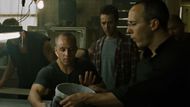Before Christopher Nolan left us scratching our heads with Inception, David Fincher did that with Fight Club. More than Edward Norton's unnamed Narrator, it is about how capitalism has weighed down his life. In the end, he finally becomes free from all of it, and himself, of course. But then there's more to it; he does become free, and he did that in multiple planes.
The David Fincher film was released in 1999, and after 25 years, that movie still hits the nerve; it's an eye-opener for the ones who don't see what's wrong with this world. To that end, it is safe to say that the film was totally ahead of its time. Although Fincher did bring the story to life on screen, it was Chuck Palahniuk who brought the story to life in 1996.
Many films came and became cult classics, but defining Fight Club as a cult classic won't simply be enough; it has a whole lot of different fan bases even today. If cult classics are sharks swimming in an ocean, this one's a Megalodon.
Disclaimer: The article is a reflection of the writer's opinions.
Fight Club's ending from the perspective of a logical mind

We won't be talking about the moot point of Fight Club; we all know that Tyler Durden (Brad Pitt) was never there. We'll be touching on the very end of the film, where the unnamed narrator and Marla Singer (Helena Bonham Carter) stand together, watching a cluster of skyscrapers blow.
Now, one interpretation of this is that Norton's character actually came to his senses after all. Tyler Durden is dead, or vanished, given that he was never real, and all that remains is the Narrator.
But then his (Durden's) plans (and bombs) are in place already, and there is so much the Narrator can do now. So he simply stands beside Marla, and both of them watch the city go boom. He finally let go.
Fight Club's ending from the perspective of a hallucinatory mind

Now, there's another angle to it. What if he never came back to his senses? In that case, everything that happened in Fight Club was simply a figment of his imagination; that's the power of a hallucinatory mind.
That brings us to another possibility: the bombs were never in place, which means the entire fight club was never a real thing. That at least gives us an assurance that Meat Loaf never died, as he never existed.
Here, the city blew apart with all the debt buried under its ashes. He was finally free from consumerism, debt, corporations, all of it. All that remained were him and Marla. At least in his mind, now he can slide.
Marla was the key to his freedom
Now, this works both ways. Marla was the ultimate key to his freedom. If we go by the logical part, it was the telephone call that made all the difference. The Narrator picked that name, Tyler Durden, on the line, and she repeated:
"Tyler Durden, Tyler Durden."
Then there's the hallucinatory part. If we look closely at Fight Club, no one actually focused on her in the support groups. Now that she is a part of his imagination, he might not be angry but jealous, not because she's attending the meetings but because she isn't with him. We need to take into account that all of this is buried within his mind.
And then there's the part where he is annoyed with all that love-making upstairs. If she wasn't real, nor Tyler, then that makes sense that he can actually hear them doing all that.
Whatever the case was, she was the key to his freedom. If she was real, then she saved him from Tyler; if she wasn't, at least he had someone to keep him company, even granting that it was all in his mind.
Or it could all be a fantasy; after all, he was the Narrator of the story.
Also Read: Flight Risk ending explained: What happens to Daryl? Details explored
Love movies? Try our Box Office Game and Movie Grid Game to test your film knowledge and have some fun!
